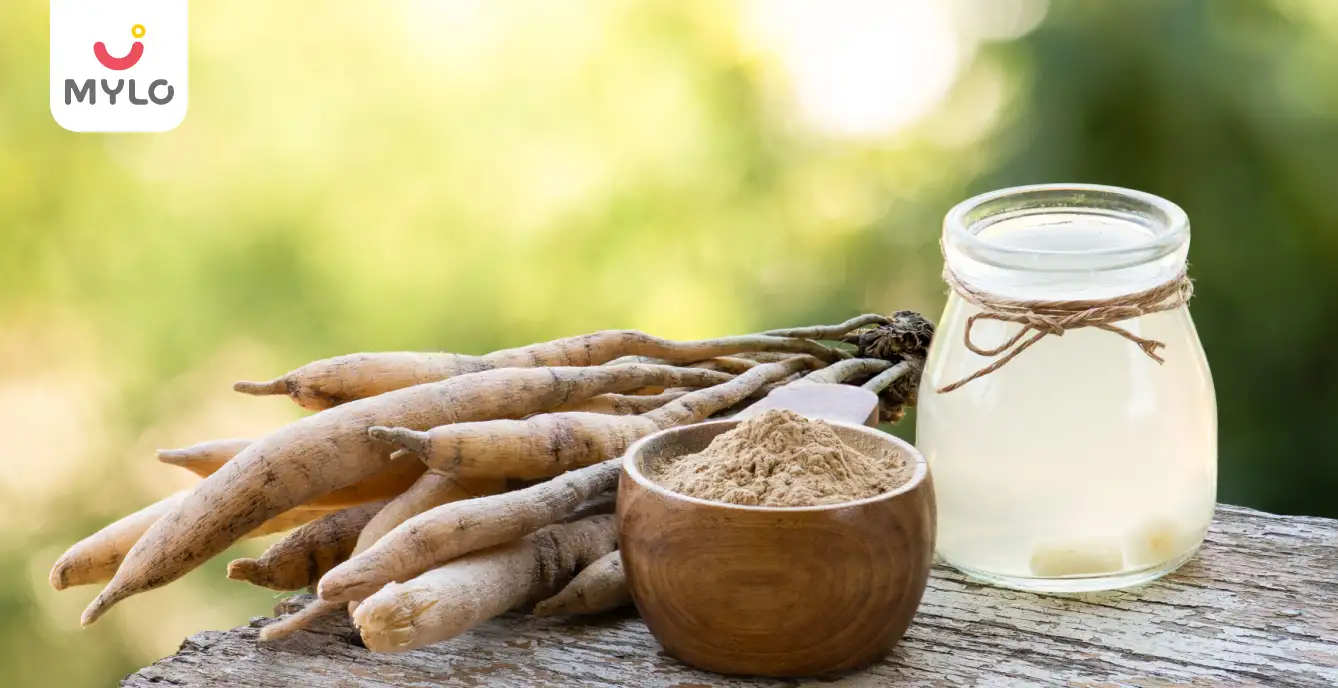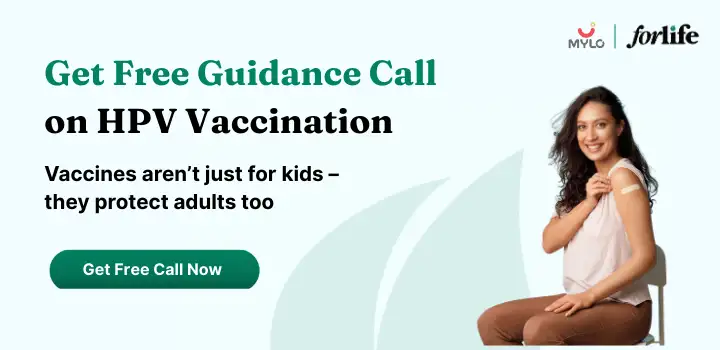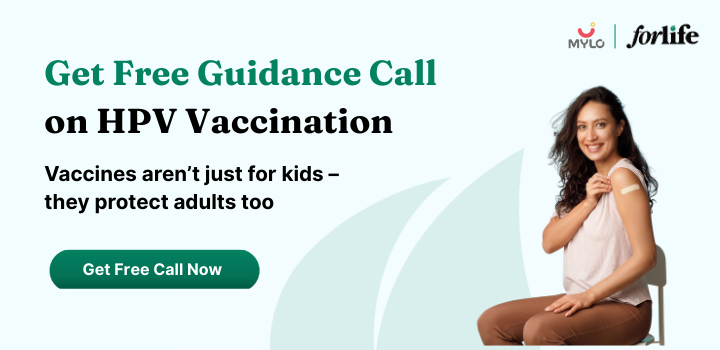Home

HPV Vaccination and the Only Preventable Cancer There Is
In this Article
HPV Vaccination and the Only Preventable Cancer There Is
Updated on 4 September 2025
Cervical cancer is the ONLY cancer we can almost completely prevent. Yet every 7 minutes, we lose a woman in India to this preventable disease.
While most cancers remain medical mysteries when it comes to prevention, cervical cancer stands apart. We know its exact cause, and we know how to stop it – by targeting the virus behind it.
What is HPV? Why should you care?
Human Papillomavirus (HPV) is an incredibly common viral infection - so common that 8 out of 10 women will encounter it at some point in their lives.
What makes HPV particularly concerning is how quietly it works. You might feel perfectly fine while it's there, doing its damage behind the scenes.
Sometimes the body clears HPV on its own. But often, it lingers silently for years - until it leads to something as serious as cancer.
HPV can cause:
-
Cervical cancer, the second most common cancer in women in India
-
Vaginal and vulvar cancers
-
Anal cancer
-
Head and neck cancers
-
Genital warts
The sobering reality? In India, we lose one woman to cervical cancer every seven minutes. That's a mother, daughter, sister, or friend gone from a disease that’s completely preventable!
What is HPV vaccine
HPV has had a vaccine for nearly two decades now, and it’s a safe, effective way to protect against the types of HPV that can cause multiple cancers and genital warts.
HPV vaccine is approved for women up to age 45 and the schedule varies - 2 doses if started early (before age of 15), 3 doses otherwise.
Dosing Schedule: Girls 9–14 years: 2 doses | Women 15–45 years: 3 doses
Globally trusted protection
The HPV vaccine is a medical marvel with results that speak for themselves:
-
Up to 98% effective in preventing HPV-related cancers
-
Safe track record with over 300 million doses given worldwide since 2006
-
Strongly recommended by WHO, CDC, and India's leading medical authorities including FOGSI, IAP, and IMA
Common concerns women have about HPV Vaccine!!
I’ve just had a baby, why bother now
This is the perfect time to think about HPV vaccination. Pregnancy and childbirth can weaken your immune system, making you more vulnerable to infections.
But I'm over 30 and married
The HPV vaccine is approved for women up to age 45 for a reason. Even if you've been exposed to some HPV types, the vaccine protects you from other dangerous strains you may not have encountered yet.
It's not safe/too new
The vaccine has been rigorously tested and monitored for nearly two decades and the safety profile is excellent.
My natural immunity is enough
When you get HPV naturally, your body’s immunity doesn’t stop reinfection and protects only against that one type of HPV. The vaccine builds a longer-lasting immunity and shields you from many cancer-causing HPV types.
But I'm a mom with bigger priorities
It may feel like one more thing on your to-do list, but it’s actually the foundation for everything else - your health, your family, your future. Your children learn from watching you prioritize health, and they need you strong and healthy for all the years ahead.
Your Family's Health Starts With YOU!!
Your health journey starts with a single conversation. No matter where you are in life – building your career, raising your family, or planning your future – this vaccine is an investment in the life you want to live.
Talk to your doctor about HPV vaccination. Ask questions. Share your concerns.
When you take care of yourself, you're better equipped to take care of everyone else.
When you choose HPV vaccination, you protect yourself and set an example of strength for your family - showing that prevention is the most powerful act of care.
Frequently Asked Questions
1) What is HPV and how can it affect me?
Human Papillomavirus (HPV) is a group of viruses, mainly spread through skin-to-skin sexual contact. About ~85% people will get it at some point in their lives, often without knowing, as early infection usually has no symptoms.
In rare cases, it can spread through non-sexual contact, or from mother to child during birth.
2) Why should I take the HPV vaccine?
HPV vaccine can help reduce the risk of HPV-related cancers and genital warts. You must take the vaccine, so your future is built on smart health choices you make today, at the right time. Studies have shown that HPV vaccines provide up to 98% protection against certain HPV-related cancers and diseases, depending on the specific type of vaccine used.
3) Who should take the HPV vaccine?
Anyone between 9 and 45 years of age can get the vaccine. The best time to get vaccinated is between 9 and 14 years old, when only 2 doses are needed for full protection.
People between 15-45 years need 3 doses in a span of 6 months.
4) Are there any side effects of this vaccine?
HPV vaccine is very safe and well tolerated. Some people may experience mild side effects like redness, swelling where the shot was given, a mild headache or low-grade fever.
These side effects are usually short-lived and go away on their own without any problems.
5) Does everyone who gets HPV develop cancer?
No. Many HPV infections go away on their own but some high-risk types, like HPV 16 and 18, can cause cancers such as cervical, vaginal, vulvar, anal, and certain head and neck cancers.
6) If I already have contracted HPV, will the vaccine help?
The vaccine won’t treat an existing HPV infection, but it can protect you from other high-risk HPV types you haven’t yet encountered. So even if you’ve been exposed to HPV, vaccination still lowers your risk of other HPV-related diseases.
7) My daughter is in her pre-teens. Does she need the vaccine?
Getting the HPV vaccine before you turn 15 helps your body build much stronger protection- about twice as strong compared to getting it after 15. That’s why HPV vaccination is recommended for girls aged 9 and older.
8) Can pregnant women take HPV vaccine?
The HPV vaccine isn’t recommended during pregnancy, If you’ve already started the doses, you can safely pause and continue the remaining ones after your delivery
7) Can breastfeeding women take HPV vaccine?
Indian and global medical bodies strongly support HPV vaccination during breastfeeding. Post-partum women are even more prone to HPV infection due to compromised immune system.
Cervical cancer is the ONLY cancer we can almost completely prevent. Yet every 7 minutes, we lose a woman in India to this preventable disease.
While most cancers remain medical mysteries when it comes to prevention, cervical cancer stands apart. We know its exact cause, and we know how to stop it – by targeting the virus behind it.
What is HPV? Why should you care?
Human Papillomavirus (HPV) is an incredibly common viral infection - so common that 8 out of 10 women will encounter it at some point in their lives.
What makes HPV particularly concerning is how quietly it works. You might feel perfectly fine while it's there, doing its damage behind the scenes.
Sometimes the body clears HPV on its own. But often, it lingers silently for years - until it leads to something as serious as cancer.
HPV can cause:
-
Cervical cancer, the second most common cancer in women in India
-
Vaginal and vulvar cancers
-
Anal cancer
-
Head and neck cancers
-
Genital warts
The sobering reality? In India, we lose one woman to cervical cancer every seven minutes. That's a mother, daughter, sister, or friend gone from a disease that’s completely preventable!
What is HPV vaccine
HPV has had a vaccine for nearly two decades now, and it’s a safe, effective way to protect against the types of HPV that can cause multiple cancers and genital warts.
HPV vaccine is approved for women up to age 45 and the schedule varies - 2 doses if started early (before age of 15), 3 doses otherwise.
Dosing Schedule: Girls 9–14 years: 2 doses | Women 15–45 years: 3 doses
Globally trusted protection
The HPV vaccine is a medical marvel with results that speak for themselves:
-
Up to 98% effective in preventing HPV-related cancers
-
Safe track record with over 300 million doses given worldwide since 2006
-
Strongly recommended by WHO, CDC, and India's leading medical authorities including FOGSI, IAP, and IMA
Common concerns women have about HPV Vaccine!!
I’ve just had a baby, why bother now
This is the perfect time to think about HPV vaccination. Pregnancy and childbirth can weaken your immune system, making you more vulnerable to infections.
But I'm over 30 and married
The HPV vaccine is approved for women up to age 45 for a reason. Even if you've been exposed to some HPV types, the vaccine protects you from other dangerous strains you may not have encountered yet.
It's not safe/too new
The vaccine has been rigorously tested and monitored for nearly two decades and the safety profile is excellent.
My natural immunity is enough
When you get HPV naturally, your body’s immunity doesn’t stop reinfection and protects only against that one type of HPV. The vaccine builds a longer-lasting immunity and shields you from many cancer-causing HPV types.
But I'm a mom with bigger priorities
It may feel like one more thing on your to-do list, but it’s actually the foundation for everything else - your health, your family, your future. Your children learn from watching you prioritize health, and they need you strong and healthy for all the years ahead.
Your Family's Health Starts With YOU!!
Your health journey starts with a single conversation. No matter where you are in life – building your career, raising your family, or planning your future – this vaccine is an investment in the life you want to live.
Talk to your doctor about HPV vaccination. Ask questions. Share your concerns.
When you take care of yourself, you're better equipped to take care of everyone else.
When you choose HPV vaccination, you protect yourself and set an example of strength for your family - showing that prevention is the most powerful act of care.
Frequently Asked Questions
1) What is HPV and how can it affect me?
Human Papillomavirus (HPV) is a group of viruses, mainly spread through skin-to-skin sexual contact. About ~85% people will get it at some point in their lives, often without knowing, as early infection usually has no symptoms.
In rare cases, it can spread through non-sexual contact, or from mother to child during birth.
2) Why should I take the HPV vaccine?
HPV vaccine can help reduce the risk of HPV-related cancers and genital warts. You must take the vaccine, so your future is built on smart health choices you make today, at the right time. Studies have shown that HPV vaccines provide up to 98% protection against certain HPV-related cancers and diseases, depending on the specific type of vaccine used.
3) Who should take the HPV vaccine?
Anyone between 9 and 45 years of age can get the vaccine. The best time to get vaccinated is between 9 and 14 years old, when only 2 doses are needed for full protection.
People between 15-45 years need 3 doses in a span of 6 months.
4) Are there any side effects of this vaccine?
HPV vaccine is very safe and well tolerated. Some people may experience mild side effects like redness, swelling where the shot was given, a mild headache or low-grade fever.
These side effects are usually short-lived and go away on their own without any problems.
5) Does everyone who gets HPV develop cancer?
No. Many HPV infections go away on their own but some high-risk types, like HPV 16 and 18, can cause cancers such as cervical, vaginal, vulvar, anal, and certain head and neck cancers.
6) If I already have contracted HPV, will the vaccine help?
The vaccine won’t treat an existing HPV infection, but it can protect you from other high-risk HPV types you haven’t yet encountered. So even if you’ve been exposed to HPV, vaccination still lowers your risk of other HPV-related diseases.
7) My daughter is in her pre-teens. Does she need the vaccine?
Getting the HPV vaccine before you turn 15 helps your body build much stronger protection- about twice as strong compared to getting it after 15. That’s why HPV vaccination is recommended for girls aged 9 and older.
8) Can pregnant women take HPV vaccine?
The HPV vaccine isn’t recommended during pregnancy, If you’ve already started the doses, you can safely pause and continue the remaining ones after your delivery
7) Can breastfeeding women take HPV vaccine?
Indian and global medical bodies strongly support HPV vaccination during breastfeeding. Post-partum women are even more prone to HPV infection due to compromised immune system.



Written by
Priyanka Verma
Priyanka is an experienced editor & content writer with great attention to detail. Mother to an 11-year-old, she's a ski
Read MoreGet baby's diet chart, and growth tips

Related Articles
Related Questions
Hello frnds..still no pain...doctor said head fix nhi hua hai..bt vagina me pain hai aur back pain bhi... anyone having same issues??

Kon kon c chije aisi hai jo pregnancy mei gas acidity jalan karti hain... Koi btayega plz bcz mujhe aksar khane ke baad hi samagh aata hai ki is chij se gas acidity jalan ho gyi hai. Please share your knowledge

I am 13 week pregnancy. Anyone having Storione-xt tablet. It better to have morning or night ???

Hlo to be moms....i hv a query...in my 9.5 wk i feel body joint pain like in ankle, knee, wrist, shoulder, toes....pain intensity is high...i cnt sleep....what should i do pls help....cn i cosult my doc.

Influenza and boostrix injection kisiko laga hai kya 8 month pregnancy me and q lagta hai ye plz reply me

RECENTLY PUBLISHED ARTICLES
our most recent articles

TV & OTT
10 Bold Web Series Streaming on Hotstar That Break the Mold

Growth & Development
How Climate and Seasonal Shifts Influence RSV Transmission and Outbreaks

Growth & Development
Understanding RSV And Its Long-Term Impact On Lung Health In Preterm Infants

Growth & Development
Preventing Respiratory Syncytial Virus (RSV) In Preemies: Essential Steps For New Parents

Growth & Development
How Respiratory Syncytial Virus (RSV) Impacts Premature Babies Differently: What Every Parent Needs To Know

Health & Wellness
Unlocking the Hidden Potential: 8 Incredible Shatavari Powder Uses for Men and Women
- Are You Aware of These 11 Early Signs and Symptoms of Pregnancy?
- Top 5 tips to build a budget-friendly nursery for your little one
- Toddler Teething: What to Expect and How to Help
- Adverbs: A Comprehensive Guide to help small children learn the usage of adverbs
- Expand Your Child's Vocabulary with words that start with X: Easy, Positive, and Engaging Words, Animals, Countries, and Fruits
- Unlocking Language Proficiency: The Ultimate Guide to Top 100 Sight Words for Kindergarten and Beyond
- Exploring Common Words that Start with P to Enhance Vocabulary in Small Children
- 100+ Common Words that start with L to Enhance the Vocabulary of Small Children
- 100 Common Words that start with 'C' for Small Children
- List of 100+ Common Words that start with 'D' for Small Children
- 100 Common Words that start with 'S' for enhancing vocabulary in small children
- List of Most Common Words that start with v for small children
- Common Words that start with n for enhancing learning in small children
- Words that start with O for early learning in small kids


AWARDS AND RECOGNITION

Mylo wins Forbes D2C Disruptor award

Mylo wins The Economic Times Promising Brands 2022
AS SEEN IN

- Mylo Care: Effective and science-backed personal care and wellness solutions for a joyful you.
- Mylo Baby: Science-backed, gentle and effective personal care & hygiene range for your little one.
- Mylo Community: Trusted and empathetic community of 10mn+ parents and experts.
Product Categories
baby carrier | baby soap | baby wipes | stretch marks cream | baby cream | baby shampoo | baby massage oil | baby hair oil | stretch marks oil | baby body wash | baby powder | baby lotion | diaper rash cream | newborn diapers | teether | baby kajal | baby diapers | cloth diapers |






